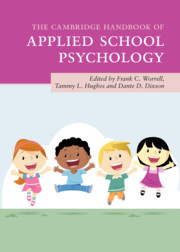Book contents
- The Cambridge Handbook of Applied School Psychology
- The Cambridge Handbook of Applied School Psychology
- Copyright page
- Contents
- Contributors
- Contributor Biographies
- Acknowledgments
- 1 Broadening the Focus of School Psychology Practice
- Part I Individual-Level Academic Interventions
- Part II Teacher- and System-Level Interventions
- Part III Interventions from Educational and Social/Personality Psychology
- 10 Belonging in Schools: A Social Psychological Perspective
- 11 Cross-Race/Ethnic Friendships in School
- 12 Self-Regulated Learning in School Contexts
- 13 School Environments that Facilitate Delaying Gratification
- 14 Understanding and Cultivating Hope in School
- 15 School Settings that Facilitate High Teacher Expectations
- 16 Parental Autonomy and Relatedness Support
- 17 Preventing and Minimizing Stereotype Threat in School Settings
- 18 The Hidden Classroom: How Gender Stereotypes Impact Academic Achievement
- Part IV Behavioral and Social-Emotional Interventions
- Part V Health and Pediatric Interventions
- Part VI Family Connections and Life Transitions
- Part VII Special Populations
- Part VIII Conclusion
- Index
- References
16 - Parental Autonomy and Relatedness Support
from Part III - Interventions from Educational and Social/Personality Psychology
Published online by Cambridge University Press: 18 September 2020
- The Cambridge Handbook of Applied School Psychology
- The Cambridge Handbook of Applied School Psychology
- Copyright page
- Contents
- Contributors
- Contributor Biographies
- Acknowledgments
- 1 Broadening the Focus of School Psychology Practice
- Part I Individual-Level Academic Interventions
- Part II Teacher- and System-Level Interventions
- Part III Interventions from Educational and Social/Personality Psychology
- 10 Belonging in Schools: A Social Psychological Perspective
- 11 Cross-Race/Ethnic Friendships in School
- 12 Self-Regulated Learning in School Contexts
- 13 School Environments that Facilitate Delaying Gratification
- 14 Understanding and Cultivating Hope in School
- 15 School Settings that Facilitate High Teacher Expectations
- 16 Parental Autonomy and Relatedness Support
- 17 Preventing and Minimizing Stereotype Threat in School Settings
- 18 The Hidden Classroom: How Gender Stereotypes Impact Academic Achievement
- Part IV Behavioral and Social-Emotional Interventions
- Part V Health and Pediatric Interventions
- Part VI Family Connections and Life Transitions
- Part VII Special Populations
- Part VIII Conclusion
- Index
- References
Summary
Parental autonomy and relatedness support are crucial aspects of parental involvement and address core psychological needs. Although parental autonomy support has been incorporated into successful prevention programs, broader preventive possibilities will be examined. Six parental autonomy support intervention studies have been conducted with mostly middle to high socioeconomic status (SES) students in the United States, Canada, and Italy, yielding positive effects on intrinsic motivation, emotions toward learning, engagement, altruism, and mental health. Although cross-sectional and longitudinal studies have indicated that parental autonomy support promotes positive outcomes among students across all SES levels and in diverse countries, it is time to assess whether parental autonomy support interventions are equally or more effective for youth of low-SES backgrounds, diverse ethnicities, and diverse nationalities. The specific components of parental autonomy support will be discussed, as well as the potential to integrate autonomy supportive parenting with other valuable aspects of parent involvement.
Keywords
- Type
- Chapter
- Information
- The Cambridge Handbook of Applied School Psychology , pp. 260 - 276Publisher: Cambridge University PressPrint publication year: 2020



